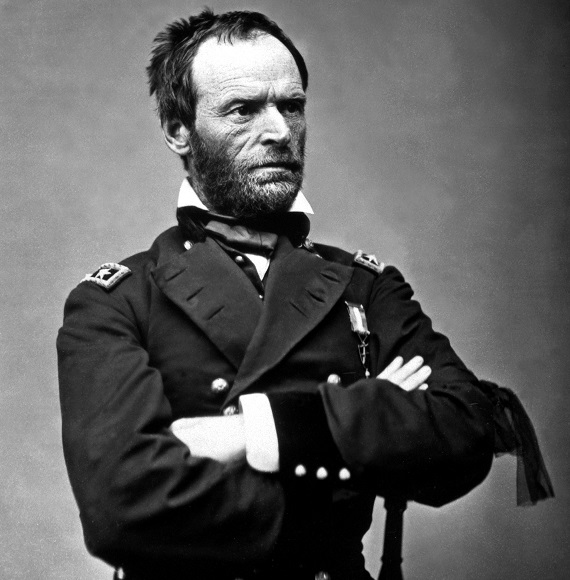William T. Sherman was a diagnosable manic-depressive. Such a man should not be in command of an army. Always with superior forces, he seldom won a battle. His famous “March” was almost entirely a terror campaign against undefended civilians. Republicans tried hard to get him to run for President which he refused with annoyance. His son became a Jesuit and then committed suicide.
Republicans also wanted to nominate General Sheridan, Sherman’s near equal as a war criminal, for President. Sheridan had been as intensive against the lives and property of civilians although on a lesser scale than Sherman. His boasting of his campaigns shocked Prussian officers. To nominate him for President, the Republicans would have to have lied that he was a natural-born citizen.
An important factor leading up to the American declaration of war against Spain in 1898 was revulsion at the cruelty of Spanish General Valeriano Weyler toward Cuban civilians. As a young officer, Weyler had been an observer with Sherman.
As for the great military hero Grant—with superior forces aided by a fleet of warships on the rivers he took nine months and several failed attempts before taking Vicksburg from a starved people.
In a few weeks during the Wilderness campaign, this great leader lost more men than Lee had in his entire force. His men called him “Butcher” and pinned their name and hometown on their uniforms when he ordered an advance. A great general is generally thought of as one who wins by skill and economy of force.
Grant presided over the most incompetent and corrupt presidential administration ever until Joe Biden got into the White House. In the election of 1872 against the Democrat Horatio Seymour, Grant received a minority of the white vote and was only elected President because of the army-controlled polls in the occupied South.
***********
The great Radical Republican leader Thaddeus Stephens received an extra $6,000 profit on each mile of railroad iron produced by his factory because of the tariff.
Cotton stealing was a major activity of Union soldiers and politicians during the war and Reconstruction. Cotton was the most valuable commodity in the U.S. before and during the war and was supreme in U.S. exports before the war. With the blockade cutting supply its value increased greatly to fill U.S. and European demand.
The Union government early on passed a Confiscation Act to seize cotton in the occupied areas of the South. At least $100,000,000 in cotton was seized–$30,000,000 more or less legally under the Confiscation Act and the rest sheer theft. Loyal Southerners burned vast amounts of their own cotton to prevent Yankee seizure. Yankee military movements were sometimes dictated by cotton stealing and Yankee generals and admirals argued over the possession of seized cotton. Lincoln allowed a large illegal trade across the lines which was a help to the Confederacy.
Of the $30,000,000 only 10% ever reached the treasury, stolen by Union officers and bureaucrats. A U.S. Secretary of the Treasury commented that a few of the agents he sent South must have been honest but none remained so very long.
Cotton stealing was the cause of one of the worst maritime disasters in history. The captain of a wooden steamboat, the Sultana, contracted at Vicksburg to take home up the Mississippi Northern soldiers recently released from Confederate POW camps. The steamboat had already been condemned for defective boilers but it was the only ship available, all the worthy vessels having been contracted profitably by Union officers to ship cotton upstream. The ship’s carrying capacity was 376 people. The Sultana departed Vicksburg April 27, 1865 with over 2,000 Northern soldiers.
On its first night out the boat exploded and burned up. The death toll from burning and drowning was estimated at over 1,195.
Southerners (Confederate people) living along the river did all they could to save survivors from the water.







Excellent as usual, Dr Wilson.
The examples you provided above remind me why I’ll take our leaders over the union’s any day; Lee, Forrest, Cleburne, Beauregard, Jackson, Stuart, Longstreet, Hill, Hampton..just to name a few. I know there are good and bad apples to be found in history on both sides of the coin because humans are involved, but the top tier of leadership in the Confederacy was unequaled. The 4-year brave defense our outnumbered people put up against the endless wave of European revolutionaries and Yankees was beyond heroic.
The war itself and the invasion falls squarely on the tyrant Lincoln’s shoulders. Unfortunately, 100’s of thousands of southern soldiers and civilians died because of his greed for tariff revenue and his own political theater.,,,and 100’s of thousands of union soldiers met southern steel and shot and paid the price, too.
That unimaginable level of American death and sacrifice is why they all must be remembered, and history must be presented as it happened without bias, accurately and honestly. For people today to just argue that it was over a single issue (the peculiar institution) is unfair to those who lived during those times, woefully inaccurate and intellectually lazy.
It’s a sad state of affairs that now more than ever the union government has chosen to cover up their historical misdeeds like terrorizing civilians and committing atrocities but instead they choose to cast aspersions about the honor of our people – once again opening up a wound and division.
One would think, if you listened to them and the media they own, that every sin ever committed from the dawn of mankind was done by a white, Christian, southern male.
When a statue of a man like Robert E. Lee is pulled down, there is something wrong with this country! For 100 years plus after the war, nearly every American politician and foreign leader would have agreed. All Americans should try to emulate his virtues and example as a Christian and as a man, as he is one of the greatest America has ever produced.
Given how the empire has chosen to attack the south once again (started a long time ago, but especially since 2015), more needs to be told on how the union tyrannized civilians and what they did to southerners, black, white, all races…not to further a divide but to make people think, especially our own people who are turning against their own ancestors.
People need to learn to think critically, humble themselves, learn from the past and turn back to God, or else individual freedom in this country can’t survive. How ironic.
And maybe stop taking pride in things that they shouldn’t be proud of but that’s a side note.
That’s why articles like this one are great ammunition for those of us who wish to tell others history they do not know and have never heard.
Bottom line – I am forever grateful of and indebted to my Tarheel and Palmetto state ancestors for standing up and fighting the empire’s invaders, to hell with the outcome!
Seems to me there are several questions here. One was starting the war. Another was fighting the war.
Personally, I have no use for Jefferson Davis, who started a war he had little chance of winning. Robert Toombs warned Davis before the attack on Fort Sumter that he would ruin the Confederacy if he attacked the fort. Toombs brought out all the salient points: the North had far more people and far more industrial capacity than the Confederacy. Also, that an attack on Fort Sumpter would rally the North; without such an attack, Lincoln would have trouble getting the North to support a sustained military action.
The people of today could care less about the details of the way the war was fought. The destruction of the Confederate memorials is as much an attack on the US itself as on the Confederacy. The bravery and perseverance of the Confederacy was as much a part of US history as the Revolutionary War. The Cultural Marxists are just as anxious to erase the memory of Lincoln and Grant as they are of Davis and Lee. The Northern states like Illinois are as much or more under attack as the southern states like Texas. Racial politics is used in the same way now as it was then; the vote was disproportionately given to uninformed minorities, who voted for racial grifters. The grifters themselves profit greatly. With the help of friendly media, they suppress news of how bad it is for the average voter, particularly minority voters.
Professor Wilson always has my attention. I recently purchased a copy of his book, “Defending Dixie.” As I have begun to read it, it was well worth the price.
Finally someone else calls Lincoln what he was – a tyrant. His false flag operation at Fort Sumter is one example. He is the one responsible for the carnage. Irrespective of whether telling the truth about him will have any worthwhile result, it must be told wherever and whenever possible.
He was the most evil US president, but FDR is a close second. And Obama/Biden is getting close!